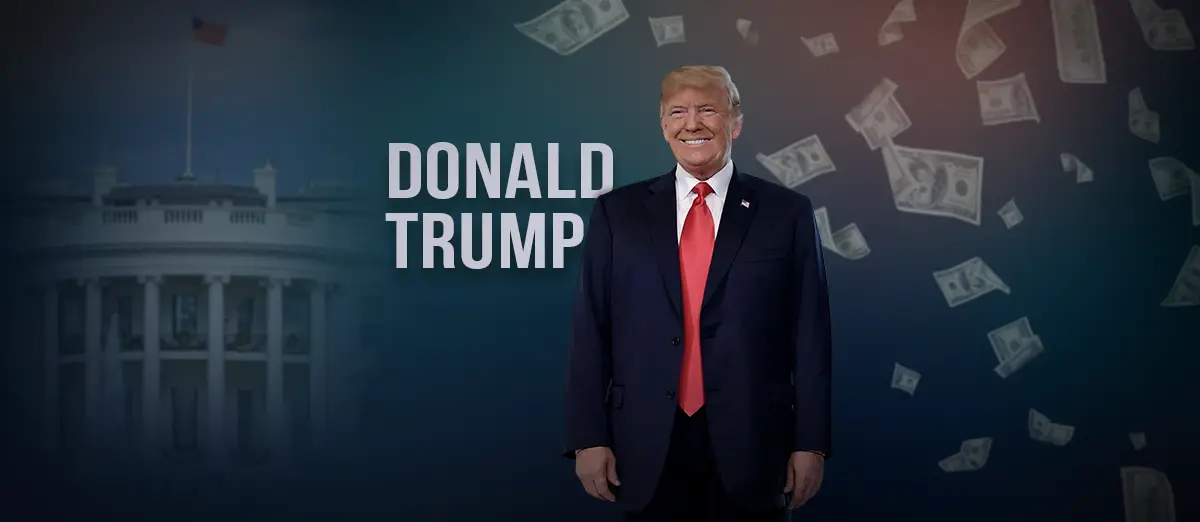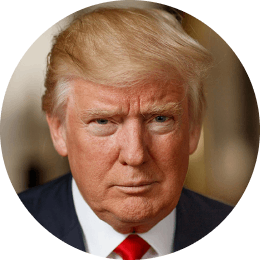Donald Trump - Rise to Wealth and Power of the Most Controversial US President

This article dives into the life of Donald Trump - a name synonymous with opulence, controversy, and unpredictability.
- In this article
- Highlights
- Beginnings
- Career
- Donald Trump Net Worth
- Where Is He Today?
- FAQ
As an American politician, media personality, and businessman, Trump’s journey from the glittering skyscrapers of Manhattan to the commanding height of the White House is a story of ambition, risk, and resilience.
Born into the world of real estate, Trump’s flair for business was evident early on. Taking the helm of his father’s company, he rebranded it as the Trump Organization, steering it toward grander ventures, including skyscrapers, hotels, and casinos.
But Trump’s empire is more than just real estate and land-based casinos. By the early 21st century, the Trump Organization had expanded into a behemoth with around 500 companies, dabbling in everything from luxury resorts to television.
We delve into the Donald Trump net worth and his multifaceted business journey. From a savvy entrepreneur building a vast empire to a controversial political figure, his story combines risk, strategy, and the unyielding pursuit of success and power.
Donald Trump Highlights

- 45th President of the United States of America
- Only the fifth candidate to be elected president while losing the popular vote
- The first U.S. president without prior government or military experience
- The first president in history not to attend his successor’s inauguration
- The first president in history to be impeached twice
- Has a net worth of around $2.6 billion
- Made most of his fortune in real estate, branding, and show business
- Went bankrupt in 1990s
Childhood and Early Years of Donald Trump
Donald Trump’s story begins on June 14, 1946, in Queens, New York City. He was born the fourth of five children to Mary Anne MacLeod and Frederick Christ Trump, Sr.
The Trump family resided in Jamaica Estates, an affluent part of Queens, setting the stage for Donald’s future in high-stakes real estate.
His father, Fred, was a successful real estate developer focusing on middle-class housing in New York’s boroughs.
This family business became a playground of learning for young Donald and his siblings, exposing them to the intricacies of real estate and construction from a young age.
Academic Journey
However, life wasn’t just about business for Donald. He faced his own set of challenges, particularly in terms of behavior. Acknowledging these difficulties, his parents decided to enroll him at the New York Military Academy when he was 13 years old.
This institution, known for its discipline and rigor, was a turning point for Trump, instilling a sense of structure and responsibility. But his military involvement ended there.
Trump’s academic journey led him from Fordham University to the Wharton School at the University of Pennsylvania, where he earned a degree in economics in 1968.
During these formative years, America was embroiled in the Vietnam War. Like his peers, some popular such as Steve Wynn, Trump faced the draft prospect.
However, a combination of educational deferments and a medical diagnosis of bone spurs kept him away from military service. In 1969, when the draft lottery was instituted, his low draft number further ensured he remained a civilian.
Donald Trump's Early Business Career
While still a college student, Trump dipped his toes into the real estate market, investing in several properties in Philadephia. This early experience set the stage for a career marked by bold moves and headline-grabbing ventures.
Upon completing his education at the Wharton School in 1968, Trump returned to New York to join his father’s thriving real estate business.
The 1970s saw him spearheading the expansion of the family business, extending its reach beyond New York City into other states like Virginia, Ohio, Nevada, and California.
However, his ambitions were not just geographical. He aimed to pivot the company’s focus from the outer brought to the glitz and prestige of Manhattan, aligning with the affluent and high society areas.
One of Trump’s early and significant moves was the development of the Grand Hyatt Hotel in 1976. This project blended innovation, negotiation skills, and leveraging relationships.
Despite lacking the funds to purchase the hotel outright, Trump used his connections with the Hyatt Hotel chain and his father’s political influence to secure a remarkable 40-year tax abatement from New York City.
The 1980s marked Trump’s rise as a real estate magnate. He developed prominent structures like the Trump Plaza cooperative apartment complex and the iconic Trump Tower, a symbol of luxury with its high-end stores.

“Get going. Move forward. Aim High. Plan a takeoff. Don't just sit on the runway and hope someone will come along and push the airplane. It simply won't happen. Change your attitude and gain some altitude. Believe me, you'll love it up here.”
Recovering from Bankruptcy
Trump’s journey as an entrepreneur is marked by his ambitious ventures and significant financial challenges.
Despite the success of his primary business operations, the Trump Organization encountered substantial difficulties, particularly with its hotels and casinos. In the early 1990s, these challenges reached a critical point.
To keep his empire afloat, Trump had to borrow heavily. The situation became so dire in 1990 that his father, Fred Trump, intervened by purchasing over $3 million in casino chips from Trump Castler, enabling the casino to cover an interest payment.
The financial strain led to two of Trump’s companies filing for bankruptcy: the Trump Taj Mahal in 1991 and the Trump Plaza Hotel in 1992.
However, Trump’s response to these challenges showcases his resilience and strategic use of bankruptcy laws. He utilized bankruptcy protection to restructure his companies' debts, managing to keep up with debt payments while accumulating more debt at higher interest rates.
This approach allowed him to navigate through turbulent financial water and emerge with his business empire restructured but intact.
Donald Trump’s Introduction to Show Business
Donald Trump’s foray into show business is as multifaceted as his real estate ventures, showcasing his knack for branding and entertainment.
His journey in this arena began with his venture into literature, most notably with the best-selling book “Trump: The Art of the Deal,” published in 1987.
Written by a ghostwriter, this book offered insights into his business philosophy and strategies, cementing his status as a savvy businessman in the public eye.
Trump’s flair for branding extended beyond books. He licensed his name to various products and ventures, from golf courses and hotel resorts to consumer goods like steaks, vodka, and bottled water.
This strategy diversified his business interests and elevated the “Trump” brand to a symbol of luxury and success.
His involvement in the pageant world further expanded his show business portfolio. From 1996 to 2015, he owned the Miss USA, Mis Teen USA, and Miss Universe pageants.
However, his foray into pageantry was not without controversy. In 2015, Univision and NBC cut ties with Donald Trump and his pageants following inflammatory remarks about Latin American immigrants during his presidential campaign.
You’re Fired
Arguably, Trump’s most significant impact on entertainment was through the reality TV show “The Apprentice.” Airing on NBC from 2004 to 2015, Trump starred as himself, a successful and no-nonsense business mogul.
The show, which involved contestants competing in business-related challenges, was a massive hit. It entertained millions and played a crucial role in shaping Trump’s public persona.
As he judged contestants with his trademark phrase, “You’re fired,” Trump reinforced his image as a charismatic, straight-talking business leader.
“The Apprentice,” along with its spin-off “Celebrity Apprentice,” helped Trump reach a national audience, establishing his brand as synonymous with business acumen and success.
Donald Trump Becomes 45th US President
Donal Trump’s path to the presidency of the United States was as unconventional as it was unexpected.
Announcing his candidacy in June 2015, many initially dismissed his campaign as a long shot. Yet, Trump’s journey from business tycoon to the Oval Office broke numerous norms and upended traditional political wisdom.
Trump’s campaign, initially underestimated by political analysts, quickly gained traction. His approach was marked by right-wing populist rhetoric, resonating with a significant electorate segment.
His eclectic and improvisational political positions seemed to strike a chord with voters seeking a departure from mainstream politics.
By March 2016, Trump had surged to the forefront of the Republican field, becoming the presumptive nominee by May. In a strategic move, he chose Indiana Governor Mike Pence as his running mate, and the pair were officially nominated at the Republican National Convention in July.
Trump’s campaign strategy was unorthodox. Despite losing the popular vote by nearly 2.9 million, his electoral college win made him the fifth candidate to be elected president while losing the popular vote.
Presidency of the Popular Entrepreneur
Trump’s presidency, a period of profound and often contentious change, left an indelible mark on the American political landscape and the world stage. Elected as the first U.S. president without prior government or military experience, unconventional methods and polarizing politics characterized his tenure from 2017 to 2021.
One of the most significant aspects of Trump’s presidency was his policy agenda. Domestically, he championed conservative causes, achieving notable successes such as implementing substantial corporate tax cuts, rolling back numerous environmental regulations, and reshaping the federal judiciary.
In international affairs, Trump’s presidency was marked by a shift towards unilateralism. He imposed stringent immigration restrictions, withdrew the U.S. from several key multilateral agreements, strengthened ties with Israel, and engaged in a high-stakes trade dispute with China.
His presidency culminated in unprecedented controversy. He was the first U.S. president to be impeached twice, the second impeachment stemming from his role in inciting the January 6 Capitol insurrection.
Additionally, breaking with over a century of tradition, Trump chose not to attend the inauguration of his successor, underscoring the deep division and tumult that marked his time in office.
Trump’s precedence was a chapter of significant transformation and turmoil in American history.
Donald Trump Net Worth and Wealth
The “Donald Trump's net worth” has been a subject of much debate and speculation. As of 2023, Forbes estimates his net worth at around $2.6 billion, though Trump has often claimed it to be higher.
His financial journey began with gifts, loans, and an inheritance from his father, anchoring his wealth in various real estate ventures, including high-profile hotels, casinos, and even Trump golf courses.
Beyond real estate, Trump has capitalized on his brand, extending it to a range of products like neckties and steaks.
Notably, revenues have also been bolstered through political fundraisers, with funds often channeled towards stays at Trump Organization properties and legal fees.
Breaking down his assets, golf clubs and resorts constitute approximately $870 million, New York City real estate is valued at about $690 million, cash and personal assets tally up to $640 million, vehicle his social media and brand business contribute $160 million, and his non-New York City real estate holding add another $190 million.
Where Is Donald Trump Today?
Since losing the presidential election to Joe Biden, Donald Trump has remained prominent in U.S. politics.
He has continued to exert considerable influence over the Republican Party, often shaping its direction and choices. Trump has also been vocal in public rallies and media appearances, maintaining a solid presence among his supporters.
He’s known to have mulled the possibility of running for president again in 2024, keeping political speculation alive. In the 2024 election, former President Donald Trump and Vice President Kamala Harris are locked in a highly competitive race. President Joe Biden withdrew from the race and endorsed Harris, emphasizing the need for a new generation of leadership.
Trump has faced legal challenges and security concerns, including assassination threats, but continues to energize his base. Polls show a very close race, with Harris working to win over undecided voters, particularly around issues like immigration and the economy. All of America will be following the elections, wondering if this cunning businessman will be the most influential figure in the US for a second time.
FAQ
What Is Donald Trump Net Worth?
Donald Trump’s net worth is estimated at $2.6 billion as of 2023, mainly from his real estate ventures, brand licensing, and other business interests.
Is Donald Trump Married?
Yes, Donald Trump is married. He is married to Melania Trump, a former fashion model, whom he married in 2005.
To Whom Did Donald Trump Lose the Elections?
Donald Trump lost the 2020 presidential election to Joe Biden, who then became the 46th President of the United States.
Is Donald Trump in Jail?
As of now, Trump is not in jail. He has faced various legal inquiries and investigations, but he has not been incarcerated.





Review this Blog
Leave a Comment
User Comments
comments for Donald Trump - Rise to Wealth and Power of the Most Controversial US President